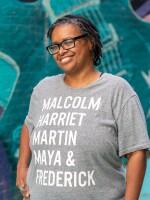A Louisvillian is working to bring food, shelter, comfort and care to over 600 orphans in South Sudan, a country that's long been mired in violence and conflict.
John Ater, who is originally from South Sudan, is the founder and executive director of Nile Orphan Care. I recently sat down with John to talk about his organization’s mission.
This conversation has been edited for length and clarity.
Michelle Tyrene Johnson: It's so great to meet you. If you could start by telling me the name of your organization and a little bit about what it does.
John Ater: Thank you, Michelle. Happy to be here. I live here in Louisville. I'm running an orphanage called Nile Orphan Care as a nonprofit registered here in Kentucky. We are supporting over 600 orphanage children in South Sudan, Africa.
MTJ: Are you helping them to find placement in other parts of the world?
JA: We are a 10-year-old organization, and we have a center that we built for those kids. We have a school for them, and we provide meals. We are still exploring the possibility of connecting those kids to the outside world, especially here in the U.S. We might have some families and individuals who might be willing to support those kids. But at least for now, the children are in South Sudan.
MTJ: Tell me a little bit about South Sudan.
JA: South Sudan — the world's youngest nation — has been at war for almost half of a century. The second civil war, which started in 1983, included 20 years of fighting. Eventually, the U.S. got involved, and South Sudan got independence in 2011. That independence did not last long, just two years, and another civil war broke out in South Sudan. That civil war has been continuing up to now. They try to make peace, and that peace does not hold, and they go back to war. And this civil war has actually created a major crisis, and, especially, we have a lot of children who have lost parents in that crisis. And this is where Nile Orphan Care came in to intervene and bring hope and love of God to those kids with no parents. South Sudan is fragile.
MTJ: Are you from South Sudan?
JA: Yes, originally I'm from South Sudan.
MTJ: You're the founder of the organization, right?
JA: I am the founder.
MTJ: How did you get here to Louisville?
JA: I came as a refugee in 2007 via Catholic Charities. My relative came before me, one of the Lost Boys from Sudan. So I've been here for almost 18 years, and Louisville has been my home. And although I go back a lot to South Sudan because of this mission, Nile Orphan Care, I'm here, and my family is here, and my kids are here.
MTJ: Oh, that's lovely.
JA: I go back at least three times a year, or even more. And it is part of my calling, not only to mobilize resources here, but to go and be part of those kids’ (lives) and give them love. Doing some strategic work that might be able to benefit children for the long term. I'm working on trying to create sustainability. The support that we get from the U.S. is unpredictable. It is good to have local sustainability. So that's part of why I'm going this time, to establish that sustainability part, so that kids might be able to have something to do and produce their own food. We just bought land, and we are looking for resources to support the food and water system there, so that they can irrigate and grow their own food.
MTJ: And do the children live at the center?
JA: We have close to 200 who stay overnight in the orphanage, and we have some that we have put into foster homes, because we don't have enough facilities to accommodate these 620 children. We are working toward that. Our goal is to make sure these kids that have suffered, that came from very difficult backgrounds, that they feel safe and they feel loved and they feel at home. So it's not easy, but that's the goal.
MTJ: For somebody who wants to support your mission, where should they go?
JA: We’re a nonprofit, which means donations are tax-deductible. You can go online to nileorphancare.org.
Being here is actually what makes that mission in South Sudan possible. It’s not easy, but I feel happy because sometimes to make a change in someone’s life is not free. But you can see the joy. I have five kids here in the U.S., and I have a wife. And every time I have to leave my children and my wife, it’s not easy. But when I see these kids, they are happy, they are smiling. They have challenges. At least for now, we can only provide one meal a day because we cannot afford two meals. Something you cannot imagine. We’re hoping to improve that.
When I go back and see those who were small and who are now grown, it fills my heart. And the same thing with those who support our organization. It makes them happy and it keeps us moving because we are making a difference in the lives of those kids.






